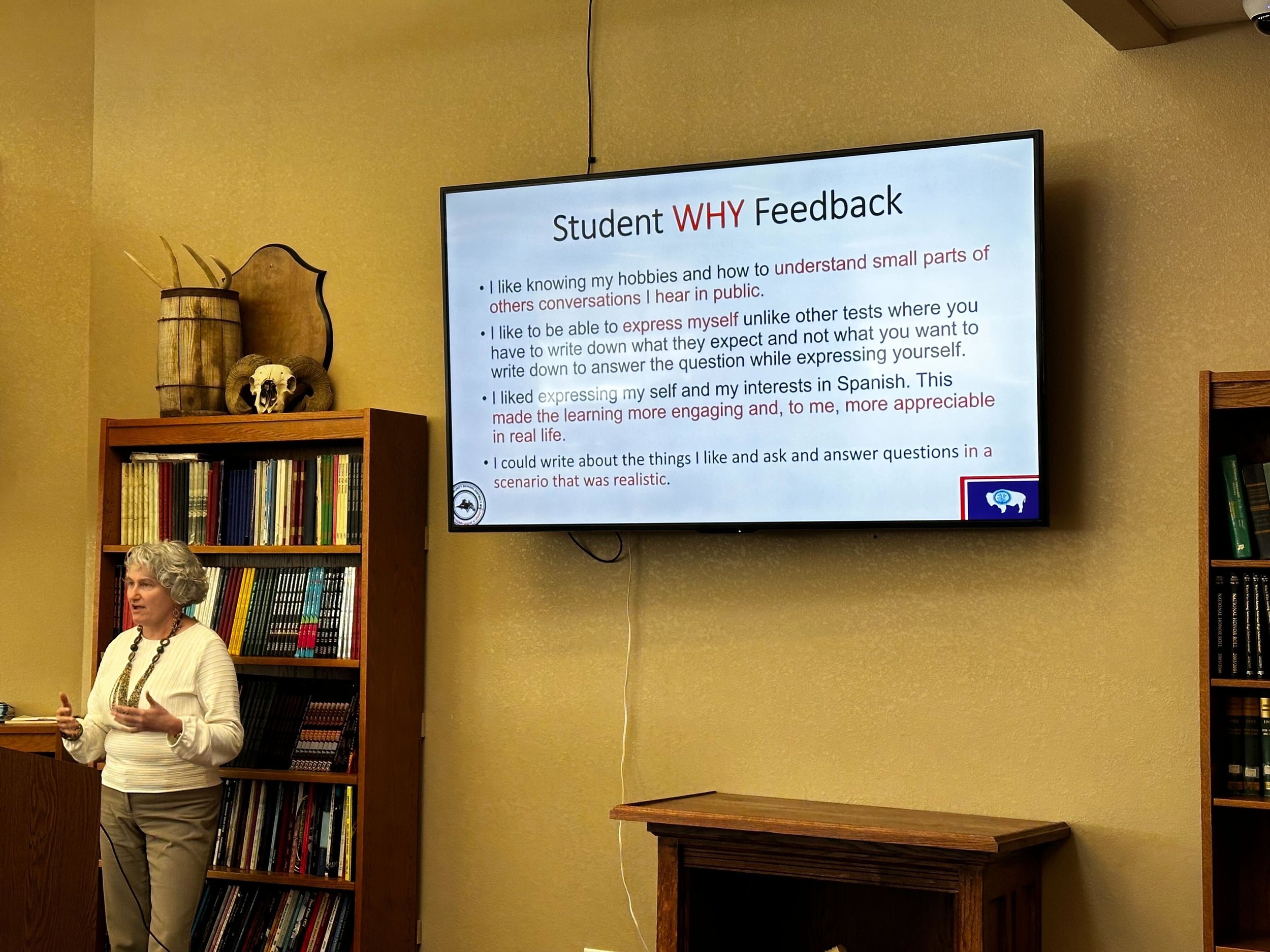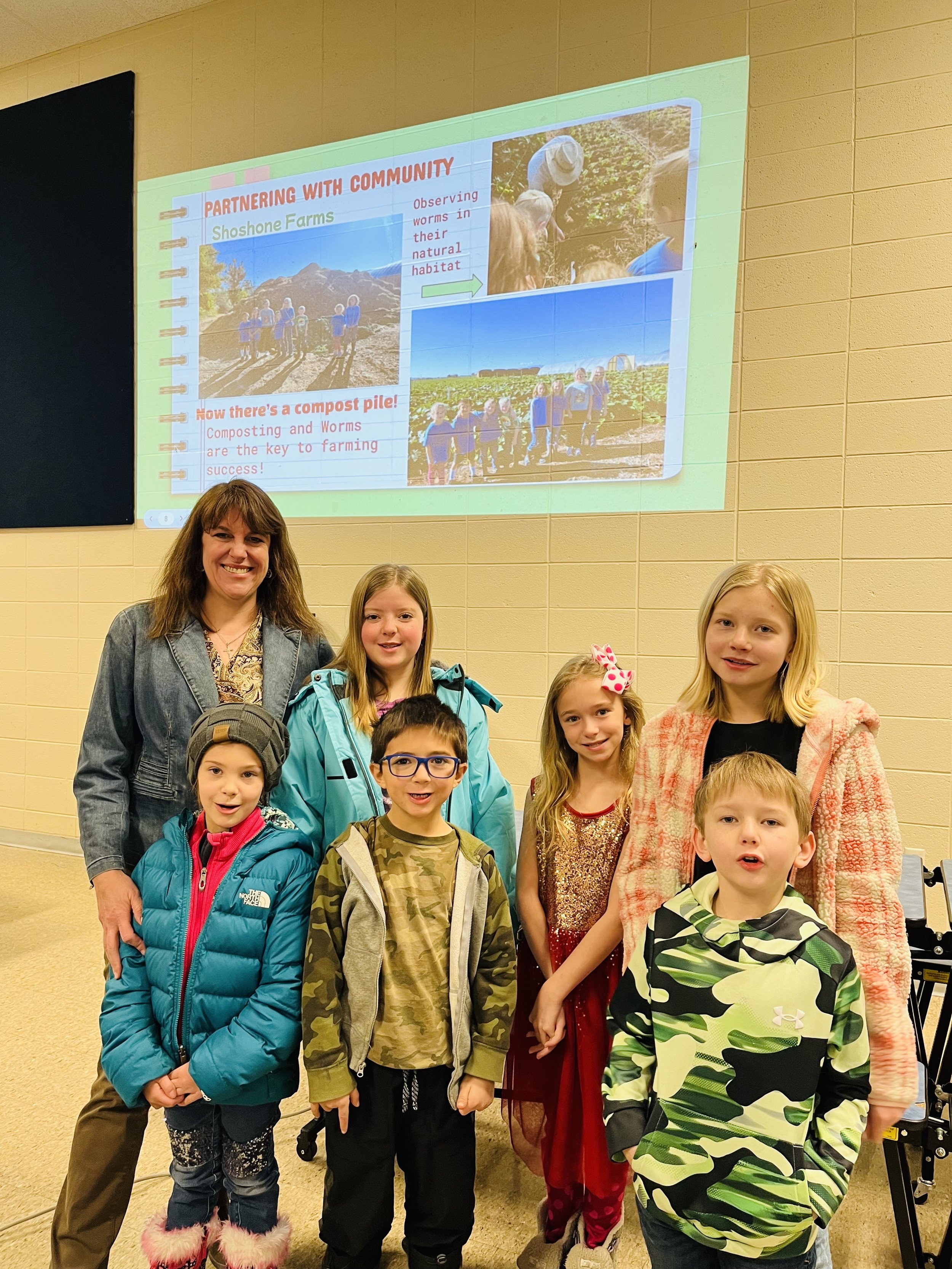One Drop: The Power of a Targeted Approach to Transformation Across Wyoming
We find ourselves in the midst of a challenging time as educators. Emerging from the Covid-19 pandemic, the challenges have reached a tipping point in communities across the country. For those bold enough, this moment of crisis also presents an opportunity to Reimagine and Innovate the Delivery of Education (RIDE).
It is with this intention that 6 institutional partners–critical players in the implementation of public education–and 9 school districts across the state of Wyoming have come together over the past year to shift from dream to design to reality. The goal of the RIDE initiative is the transformation of systems, structures, practices, and polices to become more student-centered. However, transformation is a word heavy in meaning and implications that often feels too nebulous to actualize. It can either feel like trying to catch a waterfall, or like the onslaught of a myriad of top down prescriptive mandates that will sap the creativity of professional educators and ignore the values and voices of local communities. The approach to supporting transformation in Wyoming’s RIDE Pilot Districts is different and can serve as a model of sustainable change that is personalized and responsive to local communities.
It is the power of a targeted approach, a drop rather than a waterfall. At first glance, a drop of water may seem insignificant. It is too small to quench thirst, or to erode and sculpt the landscape, and perhaps it seems unremarkable. However, if we shift our perspective and watch that single drop fall into a puddle, a pond, a lake, we can see that it creates ripples that reach far beyond the initial drop. Collectively, several of these drops can amplify their reach, and what starts to emerge is so much larger than the initial drop.
This is the case in each of the pilot districts, where educators have each focused on just one drop that has had ripple effects on aspects of instruction and assessment practices, as well as structures like time and talent, systems, and even policy. Collaborating, learning, designing, implementing, and reflecting together as part of local and statewide Communities of Practice (COP), educators in each of these 9 districts are lighting the fires of transformation to more student-centered learning across Wyoming.
In February, educators from each of the pilot districts presented their learning journey during local Celebrations of Learning. The following reflections, stories, and anecdotes provide a snapshot of the work across the RIDE Pilot Districts to date, demonstrating the power of one drop.
Transforming Assessment
(Lincoln County School District 1 Teacher)
In 4 of the pilot districts, the targeted drop or entry point for the work was performance assessment. “I feel like my end game has not been so much the assessment, but the learning along the way,” said Jordan Jackson (MS Science, Park 6). Along with Special Education teacher Erin Evans, Jackson re-designed all of their class instruction by reducing direct instruction to just a few moments and turning learning over to their students, curating learning experiences where students had choice in how they met the learning objectives.
This shift resulted in an increase in engagement, agency, and even engagement, as they saw students asking for more and pursuing opportunities to deepen their learning and share with one another. Across the state in Converse County School District 1, the Douglas Elementary School 3rd grade team of Amanda Yentes and Megan Forgey shared, “Most of our assessments are paper/pencil assessments. This process [performance assessment] has allowed us to think outside of the box and get out of our comfort zone to create an assessment that is going to be meaningful for students. It is our goal to continue creating assessments that allow students to truly demonstrate their learning in a way that is relevant and important to them.”
Now, their students are asking to take their computers home with them because they aren’t ready to stop learning and creating. This deepening engagement, relevancy, and increased student agency has the potential to impact well beyond these single moments in time.
Crystal Clark, a teacher in Lincoln County School District 1, shared, “Seeing students who struggle behaviorally/academically every day, who dread paper/pencil assessments, start to feel successful gave me that ‘this is why we do this’ moment!” Perhaps even more powerful is that their students recognized this too! One high school student reflected on performance assessment by sharing, “I liked the freedom with the entire assessment…The freedom [choice] on this test is honestly something that gives me a lot more confidence in what I’m doing.”
This sentiment was echoed across the state, and students also acknowledged that performance assessment is a better indicator of what they know and are able to do than standardized assessments. In Laramie County School District 1, after participating in a performance assessment in a Psychology class, a learner commented, “...grades are a way of showing progress. So wouldn't you want assessments, projects, tests that were more performative in order to show how good your student is getting over time rather than just giving them standardized assessments every single moment where they would have to just continue to memorize and study for tests that weren’t even beneficial to them?” If we want to prepare students for real-world authentic performance-based assessments, then educators acknowledged that instruction needs to also shift.
Transforming Instructional Practices
Instruction and assessment are intertwined and inseparable when shifting to student-centered learning. Building formative assessments that require increasing complexity and rigor, partnering with community organizations and rich diverse resources, and supporting students in asking and exploring questions of their own generation… something truly special is happening in participating elementary classrooms across Park County 6 School District.
(Michelle Dean and students, Park County School District 6)
At Valley Elementary School in Michelle Dean’s K-5 classroom, her learners are becoming experts in vermiculture (worm farming) while collaborating with the local Master Garderner’s club, creating podcasts, and designing their own science experiments. Want to know if worms like music? The students at Valley can answer this with evidence and scientific reasoning because they had the same question and designed an experiment to find out! Communication, critical thinking, and collaboration are core skills that emerged time and time again across the pilots, indicating the need for integration into instruction and assessment. As teachers embraced the role of facilitator, their students continued to step up and demonstrate what they learned and were able to do.
Students in Shaylee Poole and Dawn Peterson’s 3rd grade class at Eastside Elementary became animal adaptation experts and peer editors, supporting one another in their writing and communication, and learning from and with one another. Teachers Teresa Merager and Elise Reed from Livingston Elementary shared, “Communication between [students] as they were presenting to each other was really, really fun. It made me feel like, yes, you guys did this! When they presented, they justified the reasons why they did what they did with their pollinator home. The straws in there, why they used the colors they did… why were they going to plant the plants where they were… They were able to explain the reasons.” As teachers shared their successes and challenges, ripples continued to spread through the audience with comments like, “I have an idea about how we can shift our units too!”
Transforming the Learning Culture
In order to build a classroom culture where teachers truly know their students, and where students understand the relevance of what they are learning, Albany County School District 1 chose personalized learning, focusing their work for the RIDE pilot on strengthening student-centered assessment practices. Educators from elementary through high school collaborated to deepen their understanding, starting with building learner profiles. In reflecting on the experience, Michelle Petty shared that this work has “impacted all levels of how I approach planning, implementation, assessment, feedback, and how I will use the data going forward. I shared RIDE with my coworkers and they were interested in learning more!” The experiences of each teacher are powerful catalysts within their classrooms, schools, and districts, resulting in deeper learning for educators and students.
(Weston County School District 7 Teacher)
Deeper learning is “sticky,” relevant, and interconnected in nature. In Park County School District 16 and Weston County School District 7, educators from across K-12 explored what it means to realize the WY Profile of a Graduate by weaving together the global skills most important to their communities with content, to help learners become stronger problem solvers, critical thinkers, and communicators.
Ashyln Sutton, a first year teacher in Park 16, remarked that deeper learning has meant letting go of artificial deadlines and pacing. “You have to let go of the harsh deadlines…my scope says this so I have to be done with this by this day. Learning needs to be sticky, as we've talked about through RIDE the whole time. [Students] need to actually remember what you're talking about. So, throughout this journey, I tried to give them opportunities to show me what stuck and what didn't, in a way that works for them.”
In Weston 7, deeper learning created learning experiences where students were able to see a authentic, relevant purpose for learning about concepts such as the Salem Witch Trials or slope and ordered pairs. Increasing intentional opportunities for student agency allowed students to leverage their interests and strengths to develop scientific models and create a magazine. But the transformation and ripples weren’t limited to the student experience. Teachers reflected on how they had to let go of some control and push learners to own their learning rather than waiting to be told what to do. Part of deeper learning is placing students in the driver’s seat, and that means they’ll drive the process when it comes to assessment and showing what they know and are able to do as well.
In student-driven assessments like student-led conferences, portfolio defenses, or capstones, students have the opportunity to pull together a body of evidence, against both global skills and content, to demonstrate deep understanding and application of learning. These structures support robust school to career programs and partnerships like the one being developed in Sweetwater County 2, as well as compelling CTE portfolios and crediting for learning beyond the school building in Teton County School District 1. Participants in these districts are challenging the traditional idea that the only learning of value is what happens within the 4 walls of the classroom. Most recently, some of their students had an opportunity to share their perspective on student-centered learning and the work underway in their districts on the What Schools Could Be Big Think series, “Our WY” on February 20, 2024.
As seen in each and every story from across the RIDE Celebrations of Learning, the ripple effect of educators’ learning is impacting every part of their practice. Perhaps even more compelling is the amplification of these ripples beyond their own practice, through sharing their journey and inspiring colleagues across their school, their district, and their state. In the words of Ashlynn Sutton, “Once we're confident in our own rooms, we can spread to the rest of the school, but it's just going to be a little trickle. It's not going to be, ‘Hey everybody, we're doing this right now.’ It's going to be hard to try to change a system that's been this way for a hundred years. I'm not going to change the system alone. But I can change what my classroom looks like. It's a lot of work, but if it produces more world-ready students, isn't it something that's worth it in the end? I hope to be someone that can initiate the change in education.”
This is the story of transformation.
Stay tuned as the drops gather and ripples amplify, reaching further into the old system and truly transforming the educational landscape. To learn more about the RIDE initiative, visit https://governor.wyo.gov/ride.
Bethany Bernasconi is the 2012 New Hampshire Teacher of the Year, a 2013 ASCD Emerging Leader, a 2014 Milken Fellow, and a 2017 School ReTool Fellow. After earning a BA in Biology and a MAT in Secondary Science Education, both from Boston University, she began teaching High School in 2004 in Lincoln-Sudbury, MA. In 2009, she helped to open the doors of Windham High School where she taught Biology and was the Director of Science and Engineering 6-12 for the Windham School District. From 2015-2022 she was honored to serve as the Assistant Principal and then Principal of the Amherst Middle School in New Hampshire. In 2017, she completed her doctorate in Curriculum, Instruction, and Assessment through Walden University. Her doctoral research focused on closing the gender achievement gap in STEM through building and implementing cognitive apprenticeships in secondary school communities of practice. Currently, Bethany is a Senior Consultant with 2Revolutions. Her areas of expertise include designing and implementing competency-based learning systems, performance assessment, personalized learning, learner-centered instructional design, as well as STEM Education.




